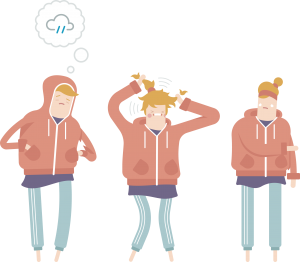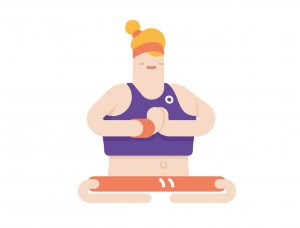Whether it’s exams, your dissertation, or the anticipation of what’s next, life can bring a rollercoaster of emotions. If you’ve already graduated and entered the working world, excitement from new opportunities is great, but you might also feel a bit lost in the turmoil of what to do next and who you are as a young adult. Major change can be stressful; and whilst we can’t totally prevent stress, one of the best ways of dealing with it, is learning how to manage it effectively.
Recognising Signs of Stress
A small amount of stress isn’t bad – it keeps you focused, alert and helps you perform under pressure.
But stress overload can take its toll on mental and physical health. We’re all different – some people thrive on challenges that make others crumble. The important thing is to know your own limits, recognise the signs early on and take steps to reduce stress levels.
Common symptoms
Feeling irritable, grumpy, miserable, not yourself
Constantly worrying or feeling anxious
Lacking energy or losing interest in things you used to enjoy
Problems with concentration, sleeping or appetite

Coping Mechanisms
Remember you have managed stressful episodes in the past: exams, the grind of revision, social situations etc.
Coping mechanisms are different for everyone. Think about what has helped you in the past and turn to those strategies again.
Use the tips in our Life section to help you:
Maintain a healthy lifestyle to help build resistance to stress
Have a good social network for relaxation and support when you need it
Adopt a positive outlook – embrace new challenges
Take control of your situation
Talk
Talking helps build awareness and realisation of what might have worked for you in the past. Talk things through with someone you trust, or a professional
.
Mindfulness
Mindfulness is an increasingly popular way of reducing anxiety, and also for improving general wellbeing and helping you sleep better. It is a mind-body approach, which focuses attention on the present moment, using meditation techniques. It can positively change the way you think, so you can manage challenging situations rather than feel overwhelmed by them.

You can practise Mindfulness by joining local classes, or online or via an App.
App or Online:
Try Headspace website or Headspace App
Described as ‘gym membership for the mind,’ it teaches mindfulness & meditation techniques from as little as 10 minutes a day
Online:
Be Mindful
Information about Mindfulness, including a directory of local teachers & an online course with free introductory sessions
Book/eBook:
‘Mindfulness in Plain English’ by Henepola Gunaratana
A bestselling classic guide to insight meditation
Find out more:
See our three-part Stress Survival Guide:
Part 1 – Good Stress, Bad Stress
What are the different types of stress and how can we recognise the signs & symptoms
Part 2 – Get the Best out of Stress
Not all stress is bad. It’s about how we see it and use it to our advantage
Part 3 – Stress Busters
Coping mechanisms to effectively manage stress
Grad Bites: Let’s Talk about Mental Health (Part I)
In this short video, Matt, a student talks about his recovery from depression, useful resources to turn to if you are feeling bad & how to help if you’re worried about someone.
Grad Bites: Let’s Talk about Mental Health (Part II)
Student Matt discusses the coping mechanisms that helped his recovery from depression, that he continues to use as effective outlets for stress & for maintaining emotional wellbeing
If you think you need professional help:
Professional Help
If things feel overwhelming and you think you need some professional help
Grad Bites: Introducing CALM (Campaign Against Living Miserably)
Rikesh Chauhan (RKZ) talks about the mental health charity and his work as an ambassador
